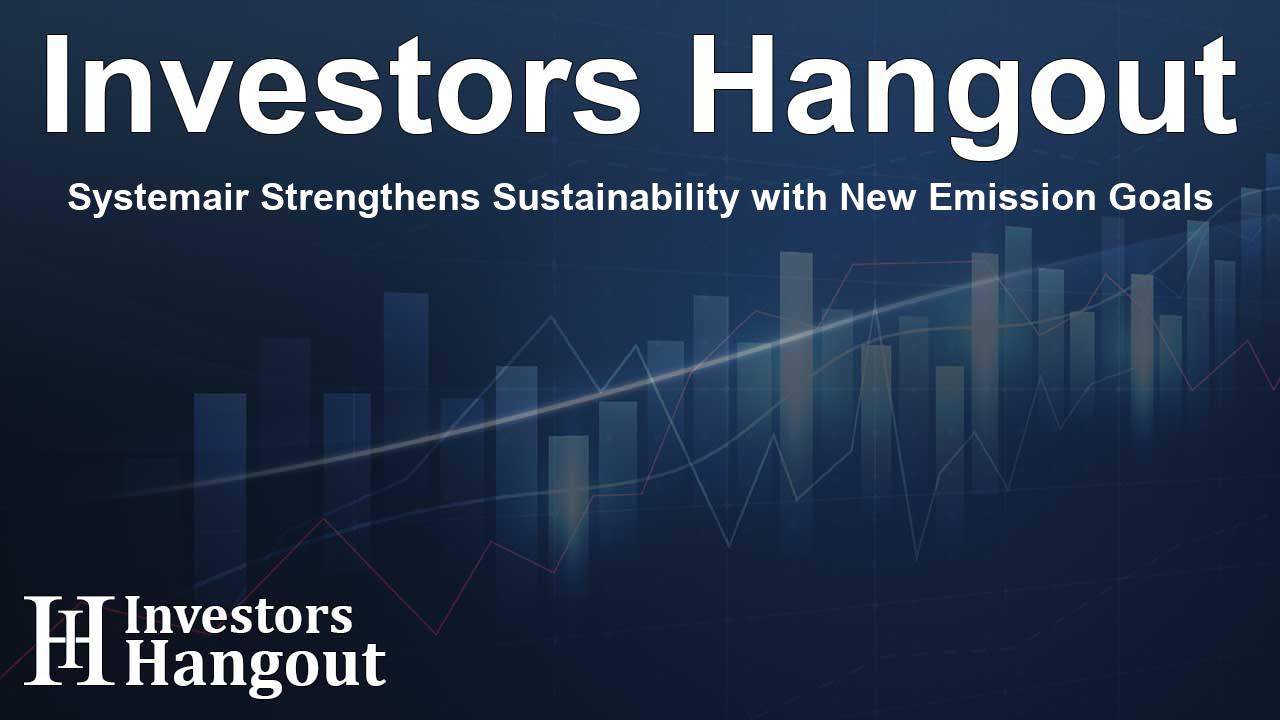Systemair Strengthens Sustainability with New Emission Goals

Systemair Emission Targets Approved by Science Based Targets Initiative
Systemair recently achieved a significant milestone in its sustainability efforts by having its emission reduction targets officially validated by the Science Based Targets Initiative (SBTi). This globally recognized initiative focuses on ensuring that corporate climate targets align with scientific guidelines aimed at curbing global warming to manageable levels.
CEO Roland Kasper remarked, "Having our emissions targets approved by the SBTi is a strong endorsement of our commitment to sustainability." This approval serves as a testament to Systemair's dedicated approach toward managing emissions across its operations.
Emission Reduction Commitment for the Future
Systemair's strategy involves comprehensive targets for both short-term and long-term emissions reductions. The company aims to tackle emissions from its operations, categorized as scopes 1 and 2, as well as indirect emissions throughout its value chain, referred to as scope 3. Specifically, Systemair has set forth the following goals:
- Achieve a reduction of absolute emissions in scopes 1 and 2 by 42% by the fiscal year 2030/31, compared to its base year of 2023/24.
- Lower absolute emissions from scope 3, which includes emissions generated from the use of sold products, by 25% within the same period.
- In the long-term vision, the goal is to reduce overall emissions (scopes 1, 2, and 3) by 90% and achieve net-zero greenhouse gas emissions by the fiscal year 2050/51.
A staggering 96% of Systemair's emissions emerge from the operational period of sold products, attributed largely to the use of fossil fuels in various countries’ electricity generation. This insight emphasizes the importance of transitioning to cleaner energy sources.
Importance of Energy Efficiency
Energy efficiency has been integral to Systemair's mission since its inception. Lee Morgan, Group Sustainability Director, emphasizes, "Even in regions where fossil-free electricity is available, the importance of energy efficiency cannot be overstated. As we seek to eliminate fossil fuel dependency through alternative technologies, we must minimize energy consumption to allow sufficient emission-free electricity for all. Energy efficiency is crucial for achieving these objectives."
With buildings accounting for about 40% of overall energy demands in society, Systemair recognizes the role it must play in the broader effort to reduce emissions and engage in climate change mitigation.
Understanding the Science Based Targets Initiative
The Science Based Targets Initiative (SBTi) is a global organization that assists businesses in establishing ambitious emission reduction goals based on rigorous scientific research. The initiative's mission is to inspire companies to significantly reduce emissions by half before 2030 and to reach net-zero targets before 2050.
Collaborating with several influential partners, including CDP, the United Nations Global Compact, and the World Resources Institute, the SBTi leads the charge in promoting best practices in emission target setting. It provides vital resources and guidance to facilitate the adoption of these principles among businesses worldwide.
About Systemair
Systemair stands tall as a premier ventilation solutions provider, operating across 51 nations worldwide, including regions such as Europe, North America, and Asia-Pacific. The company reported a remarkable turnover of SEK 12.3 billion during the latest financial year and currently employs around 6,600 dedicated individuals.
A pioneer in energy efficiency, Systemair continues to deliver innovative products that enhance indoor air quality while contributing to lower carbon emissions. The company's notable growth rate of approximately 9% annually over the last decade attests to its strong market presence.
Systemair’s shares have been traded on the Nasdaq OMX Nordic Exchange in Stockholm since October 2007, ensuring that the company remains a key player within the Large Cap List, backed by a robust network of approximately 90 subsidiary companies.
Frequently Asked Questions
What are Systemair's emission reduction targets?
Systemair aims to reduce its absolute emissions in scopes 1 and 2 by 42% by fiscal year 2030/31 and scope 3 by 25% within the same timeframe.
How does Systemair plan to achieve net-zero emissions?
Systemair plans to reduce overall emissions by 90% and attain net-zero greenhouse gas emissions by fiscal year 2050/51.
Why is energy efficiency important to Systemair?
Energy efficiency is crucial for minimizing unnecessary energy use, especially as the world transitions to cleaner technologies and reduces fossil fuel reliance.
What is the role of the Science Based Targets Initiative?
The SBTi helps businesses set science-based emission reduction targets, ensuring their goals align with climate science for effective global warming mitigation.
Where is Systemair based?
Systemair operates in 51 countries globally, specializing in ventilation solutions to improve indoor climates.
About The Author
Contact Owen Jenkins privately here. Or send an email with ATTN: Owen Jenkins as the subject to contact@investorshangout.com.
About Investors Hangout
Investors Hangout is a leading online stock forum for financial discussion and learning, offering a wide range of free tools and resources. It draws in traders of all levels, who exchange market knowledge, investigate trading tactics, and keep an eye on industry developments in real time. Featuring financial articles, stock message boards, quotes, charts, company profiles, and live news updates. Through cooperative learning and a wealth of informational resources, it helps users from novices creating their first portfolios to experts honing their techniques. Join Investors Hangout today: https://investorshangout.com/
The content of this article is based on factual, publicly available information and does not represent legal, financial, or investment advice. Investors Hangout does not offer financial advice, and the author is not a licensed financial advisor. Consult a qualified advisor before making any financial or investment decisions based on this article. This article should not be considered advice to purchase, sell, or hold any securities or other investments. If any of the material provided here is inaccurate, please contact us for corrections.
